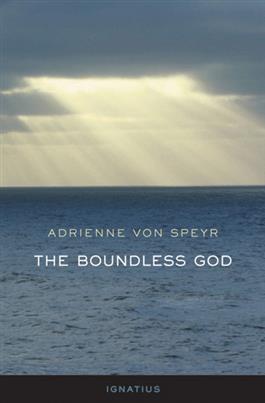Podcast: Play in new window | Download (Duration: 11:42 — 8.0MB) | Embed
Subscribe: Android | Email | RSS
A. Creation ordered to the Son and to hope
His creation’s first answer was to let itself be created, to let itself become a reality, one whose ultimate meaning was meant to rest in God but that also possessed meaning in its creaturely essence. God separated the water from the dry land, and, in this separation, the earth became an important symbol. The earth is the sure ground on which men can stand. For everything was planned for man, whom God created last of all. He handed over everything to him so that it would belong to him. This handing over was meant with the utmost sincerity and was never revoked. It placed man in a permanent relationship with the surrounding world, which was God’s gift to him. In God’s eyes, occupying man in this way was meant already to be like a prayer, for man was meant to see in created things what God had given him. He was to be able to do this by virtue of his senses and reason, in what he saw, heard, felt, and experienced. He was furnished with a sensory nature and with knowledge, and, through these, he can echo and adjust to the things over which he has dominion. However, God stands behind each and every perception and adjustment. This means, not that God allows himself to be restricted or tied down to the measure of things and experiences, but rather that his voice remains always audible. The more simple things are, the more conceivable God appears. It is not that he allows things to contain him; rather, they are signs of his presence, which can be neither diminished by the finitude of the world nor consigned to a particular space; it nonetheless remains true presence. This presence is something neither vague nor questionable: it is the presence of the Creator toward whom points the meaning that resides in created things. It is not that God’s meaning is made finite in elements, in plants, and in animals, like something exhaustible; but things can be either quiet or loud reminders that the invisible Creator lives, has created them, and, far from abandoning them, has them permanently in his care. The human spirit, which experiences and contemplates these things, is reminded by their presence of God’s existence.
The Boundless God, pp. 1-2
B. “Man is created…”
One should not represent man as a completed creature, but rather should explain, by reference to the sacrament of baptism, how even the child is already created in order to glorify the Father. Even passively being carried to baptism is an act by which the child glorifies God—indeed, the pregnancy of the woman should already be such an act: she should not only thank God that she has conceived a child, but should do so together with her child and as her child’s representative. Both glorify God in their unity.
The child is not free as to whether he will glorify God. This is his job, which he necessarily carries out. He is not there so that the parents can rejoice in him and glorify one another, but rather to glorify God. Therefore, the parents must for some time do it as his representatives. Ignatius shows the child in all the stages of his development, his job in each of these, and its recognition by the parents. The parents must constantly observe the child from the perspective that he has to glorify God.
One should carry the truth of the Foundation far beyond the Exercises, into every catechesis. At each level of development, the Foundation should again be explained anew. It is often very difficult for a child to understand his own place in the world, to situate himself. With such an explanation, one could reconfigure much of the turmoil of the formative years, to bring it more life and direction. Often, one shows children only dogma and has them memorize many things. But very often they do not know for what purpose it is all good. Ignatius puts his finger on the “para.” Perhaps children learn through some actions one offends God, sins. But they do not learn that they interiorly become sinners because they neglect their life’s purpose: to glorify God. The painful time of puberty, in which the adolescent desires to seek and situate himself, would appear completely differently if it did not happen so egoistically, if from the outset it appeared in light of service, which is always already familiar as a solid relationship. This could offer a kind of point of rest, a kind of protective enclosure within which everything could be reconfigured. Later, in maturity, the “hedge” could fall away and everything could become free and open. Children and adolescents can understand this thoroughly, if it is correctly explained to them.
Above all, train parents! Christian parents are indeed accustomed to see their children as gifts from God, but somehow at the same time they regard themselves without reference to their children’s service. Service begins with existence. It does not state, “The adult is created…,” but rather, “Man is created….”
Ignatiana. Die Nachlasswerke: Band XVI, pp. 337-339,
translated by Robert Van Alstyne, S.J.
C. Underway to God
By having been created, we are already essentially on the way to the Son. For we were created for his sake and with him as our goal. Consequently, the measure of time and space is also with him, although this measure is unknown to us. What space, what time must we traverse in order to reach the Son? We know only that it is the time of our life, though we do not know the ‘‘hour’’. The space is the Church, but we cannot measure out this space. We were created to journey toward the Son for the duration of our lives, which we live out in the Church. But since we lack both measures, a new uncertainty comes over us: we feel ourselves suspended in the void. All that is ours enters into the mystery of God, even as it also comes forth from the mystery of God. God gives us all the necessary provisions for our pilgrimage, but the source of the giving remains in him, because he is love.
And this love of God who is other, this ‘‘other’’ love, remains so overwhelmingly great that everything we undertake to imitate it can be no more than an attempt. We are like children who try to imitate the gestures of adults, their father at work, for example. But this is play. We do not perform the action itself. The meaning of the father’s gesture lies in his work. That the child does out of love something meaningless that the father does meaningfully is touching. In the same way, the man who loves God imitates something he sees God doing. He knows that his imitation is feeble and is meaningful only as an imitation of that which has all its meaning in God. The believer can do nothing else than show the Father in this way that he has understood something of the Son’s reference and that he speaks a Yes to which God alone can give content and fullness.
Man before God, pp. 25-26

